- HOME
- All Products
- Calendar
- Time blocking: Control your time and conquer your day
Time blocking: Control your time and conquer your day
- Published : March 26, 2024
- Last Updated : December 13, 2024
- 3.4K Views
- 6 Min Read
"Organize your life around your dreams and watch them come true" —Purba Chakraborty
Imagine this: You wake up, hit the gym, go to work after a shower and breakfast, tackle your to-do list for the day, complete each one of your deadlines, go home feeling accomplished, and spend time with your family.
It sounds like a dream, right? But more often than not, this is far from how our day unfolds. And the usual suspect for this is being disorganized. You can make the dream of having the perfect workday a reality now!
Meet “time blocking,” a map that can help you navigate the treacherous waters of disorganization and help you chart a course towards peak performance.
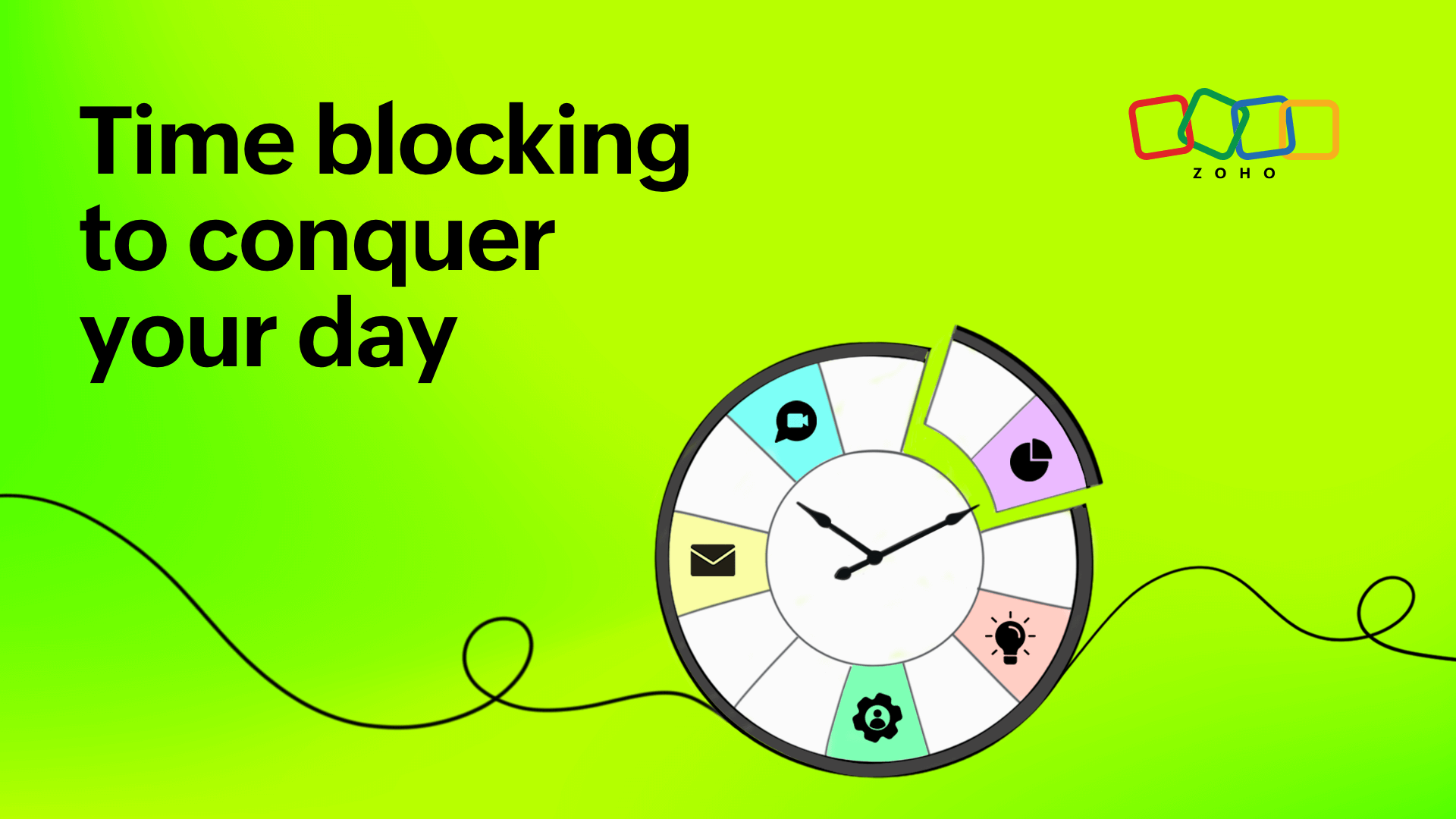
What is time blocking?
Time blocking is a technique where you split your day into separate blocks and assign a specific task to each block. This way, without procrastinating, you'll have a roadmap of what, when, and how long to work on a particular task.
Types of time blocking
Time blocking comes in different types, sizes, and nuances. Each variety will suit people with multiple priorities and projects they're working on. Let's delve into each type and explore them further.
Theme-based blocking
Here, you'll be assigning blocks of time for tasks that are similar to each other. For example, if you're the type of person who spends more of their time on emails, you can assign 30 minutes in your day to take care of all emails and chat messages. After that, you can forget about messages and focus solely on important projects.
This way, you're not always switching between projects and replying to messages. Theme-based blocking can help you be more creative and productive in your work without getting bogged down in unimportant tasks.
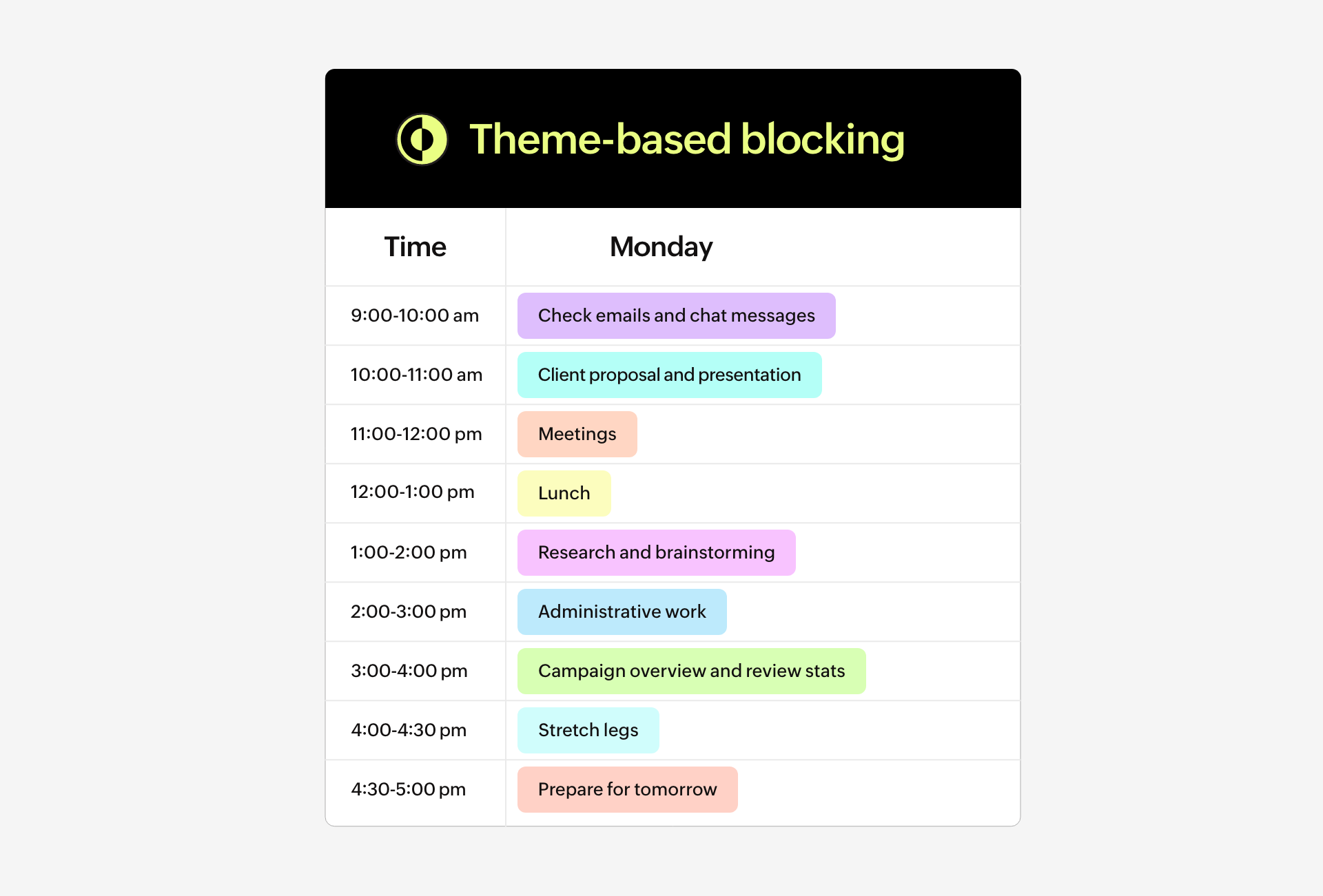
Project-based blocking
In this way of blocking, you’ll be creating different blocks in your day and assigning a specific project to each block. This is more suitable for people who are responsible for delivering multiple projects at once.
Project-based blocking lets you give time and attention to each project without feeling like you need more than two hands to keep up with your work. With project-based time blocking, you can sidestep the harmful effects of attention residue.
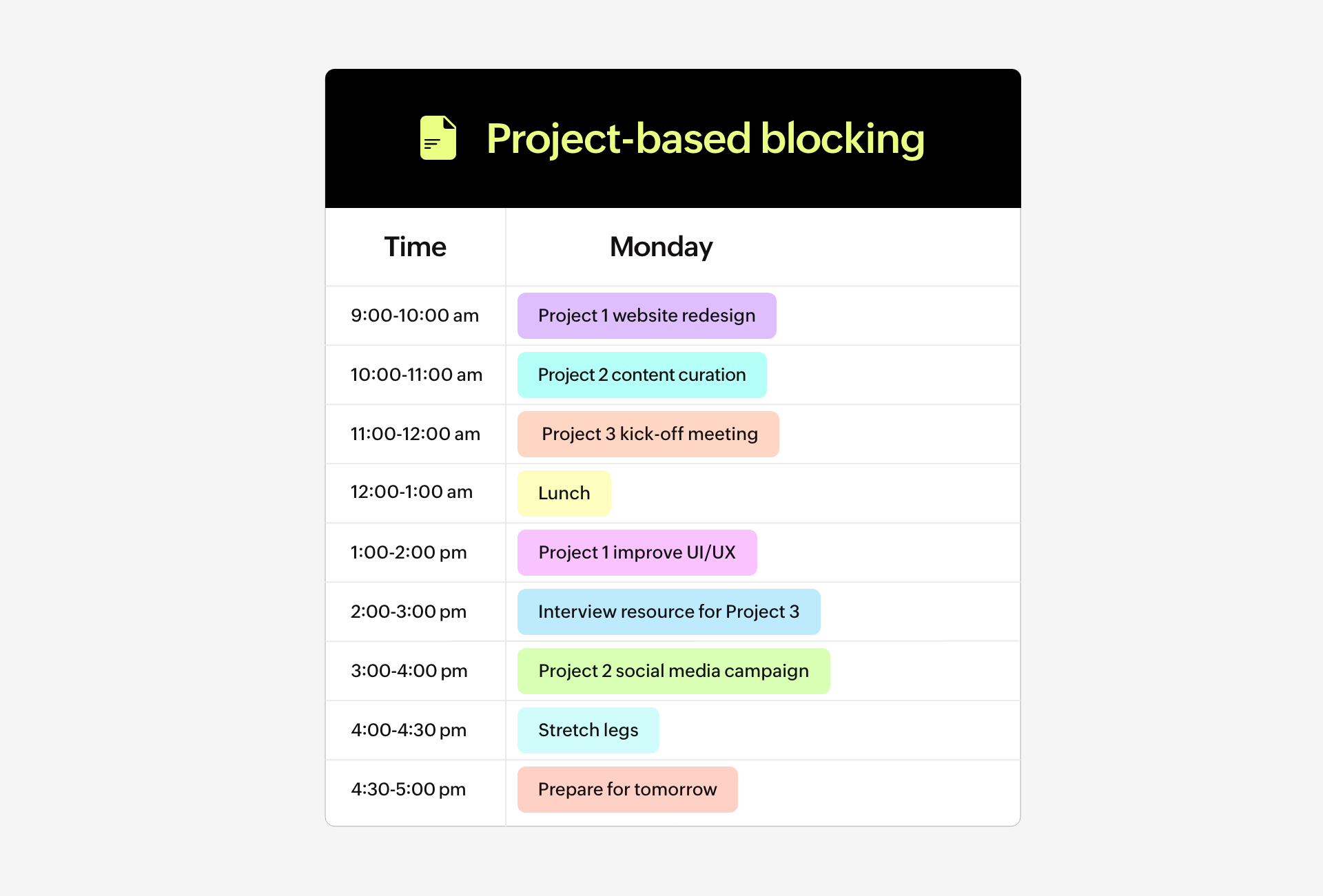
Energy-based blocking
Time blocking will become a vanity practice if you're not paying attention to your energy flow throughout the day. This is why energy-based blocking is the most effective in terms of practicality and impact.
The core of time blocking stays the same here, but instead of just splitting your day into separate blocks and assigning tasks to them, you will pair tasks with blocks that fall into a time when you feel more energized.
In this way, you can cater to more demanding tasks when your energy level is high and check off less-tedious tasks when your energy level dips.
Day-based blocking
If you take normal time blocking and practice it in a larger proportion, you get day-based blocking. Instead of blocking small chunks of time in your day, you divide your entire week into small blocks by assigning each task to each day.
This is ideal for people wearing multiple hats, like managers and entrepreneurs. You can assign a single project or task to each day and focus on it the entire day. You’ll drastically reduce distractions and increase efficiency.
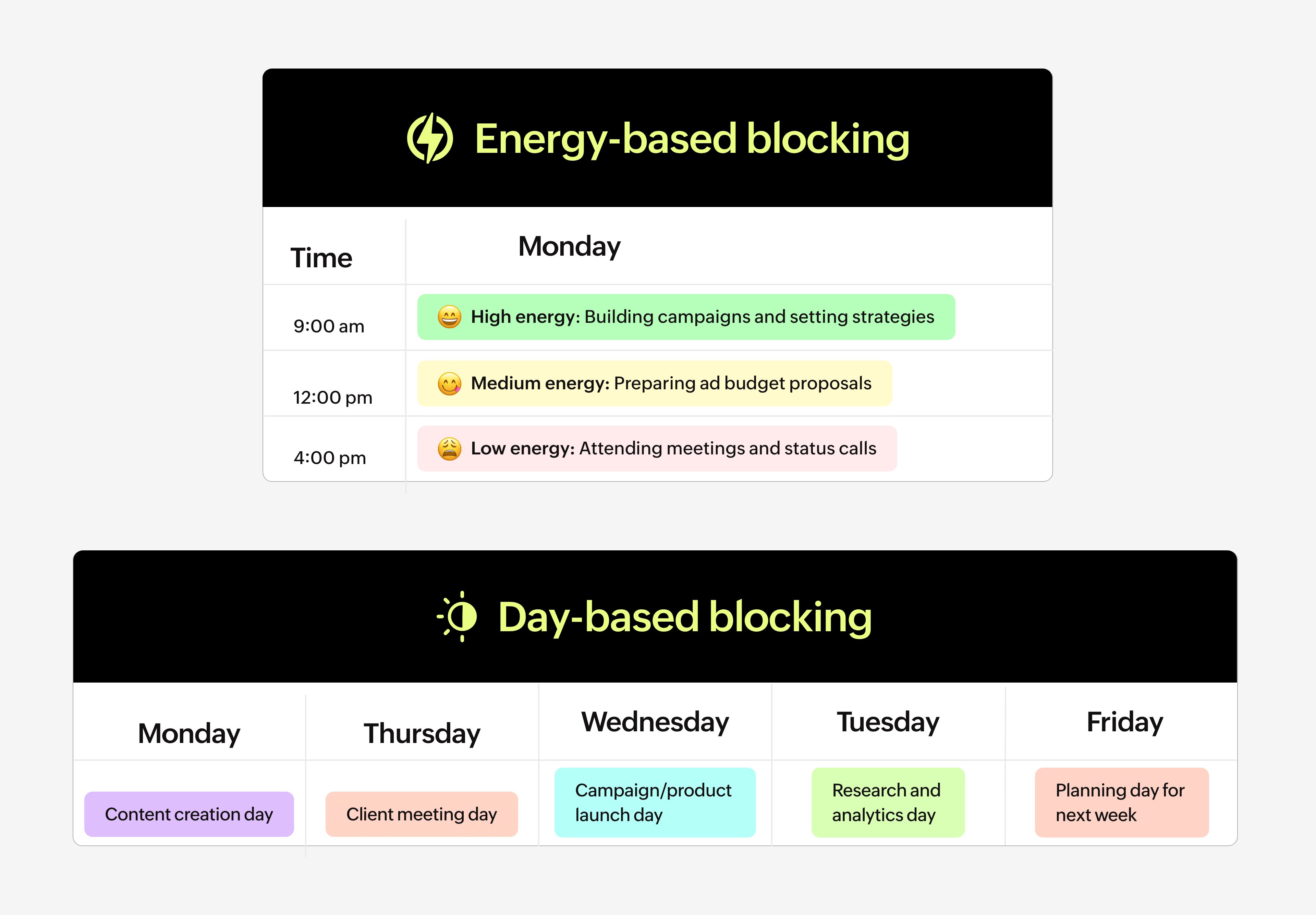
Why is time blocking a game changer?
Time blocking is a proven way of creating elite-level work and is followed by some of the biggest tech titans in the world, such as Elon Musk. So, how can creating blocks in your day be such a game-changer? Read on to find out!
It boosts your focus
Instead of being disorganized and unsure of what task you need to tackle next, time blocking gives you the route you should take to fulfill tasks and see extraordinary results. With a sense of direction like this, you negate the chance of you losing your way.
It creates a sense of accomplishment
Feeling accomplished is the recipe for maintaining a healthy relationship with your work. Time blocking lets you achieve just that. Whenever you complete a task within its allotted block, you get that sweet rush of dopamine, which drives your desire to get even more done and, in the end, makes you feel good about your workday.
It enhances better prioritization
To make time blocking fruitful, proper pre-planning is mandatory. Because we meticulously plan and carefully assign tasks to each block, it will become obvious to us where most of our time and energy are spent. We can make informed decisions and make sure that high-priority work is given precedence.
It reduces work stress and anxiety
It’s pretty common for debilitating anxiety to take over when we have a big project and looming deadlines on the horizon. But time blocking can put your mind at ease by giving you a sense of control and reducing uncertainty over your project.
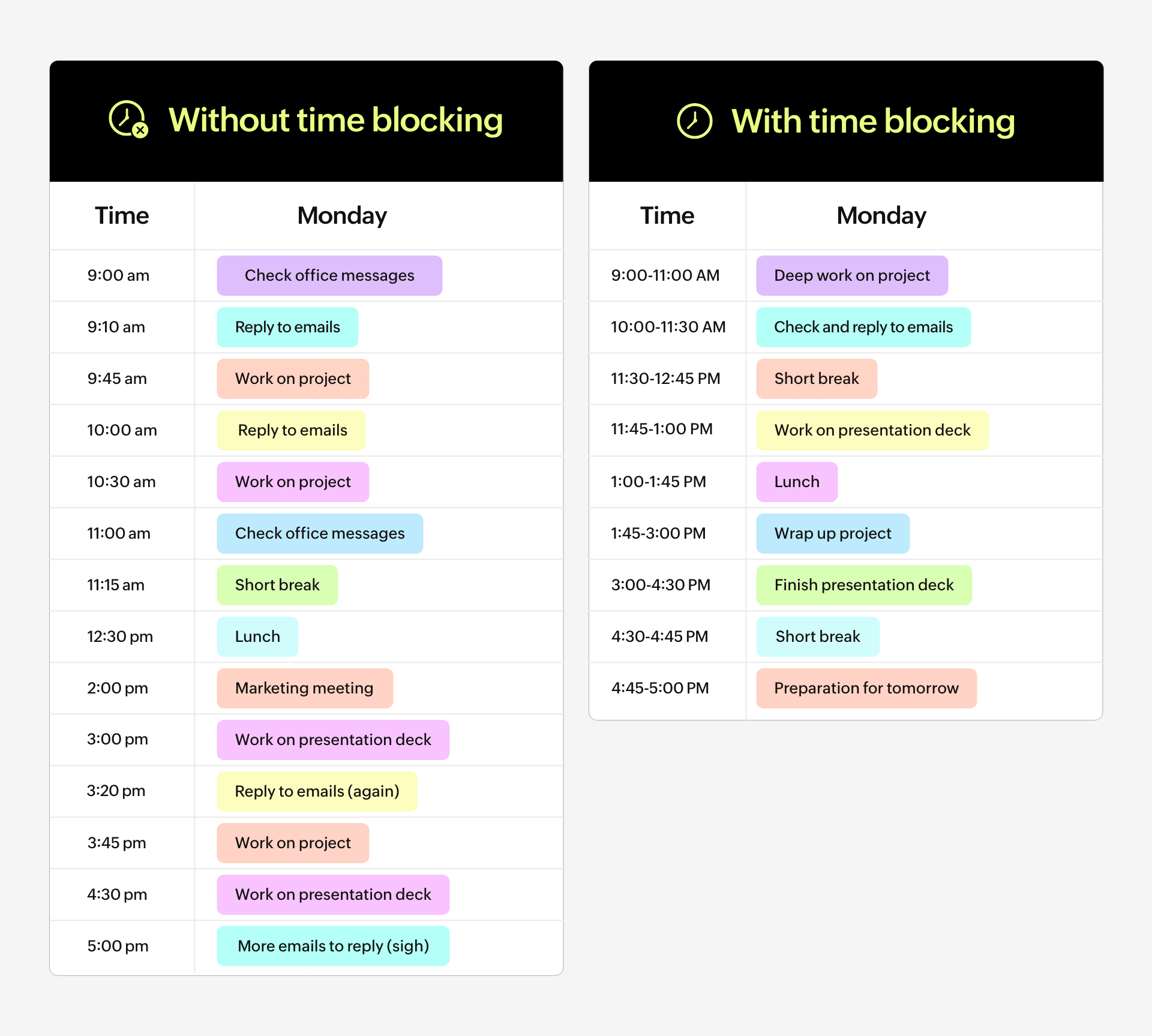
How do I block time the right way?
Now that we've acquainted ourselves with the ABCs of time blocking and how potent it can be, it can only shine when executed properly. Read on to learn all of the tips and tricks you can employ to block time properly and ensure a fruitful outcome for your hard work.
Use a calendar
Time blocking without a calendar is the equivalent of venturing into a dark, dense forest without a flashlight or a compass. You can make it out eventually, but not without exhausting your time and energy.
That's why it's wise to use a calendar—digital or on paper—to keep tabs on how well you are managing your time and which project gets more priority, among other things. A good calendar system can catapult you forward in your pursuit of controlling your time and conquering your day.
Be realistic and don't underestimate
One of the common pitfalls while practicing time blocking is being unrealistic with the time needed for completing a task and overshooting your time blocks. This has a snowball effect because you’ll feel defeated when you can’t finish your tasks within the allotted block and lose momentum for the entire day ahead.
It will take some time to develop the skill of gauging how much time you need to complete a task. So until you hone this skill, don't underestimate your tasks, and always make it a habit of having buffer blocks to catch up on work that might've spilled over.
Be kind to yourself
Imagine that you've figured out your entire workday with blocks of time allotted to each of your tasks for the day. Suddenly, you get sucked into a status call, and there goes your “Deep Work” and “Marketing Deck Preparation” blocks in the morning.
For understandable reasons, the default reaction would be to feel blue, carry that negative energy throughout the day, and not get any meaningful work done. But holding on to the initial setback can only foil the effectiveness of the rest of the time blocks that follow.
So, instead of being harsh on yourself, think of time blocking as a means of getting your tasks organized, not a system to punish yourself. Restructure your blocks based on priority and keep going to end the day on a high.
Review and improvise regularly
Just like any time management strategy, time blocking works best if you regularly review it and make changes to fit your everyday priorities. It shouldn’t be a template for you to follow at face value, but a flexible guide to help you navigate your workday.
Without review and adjustment, the chances of the time-blocking technique failing are high. This is why, based on your energy levels, the project you've undertaken, or your work commitment, you should constantly adjust and tweak this technique until it starts to work wonders for you.
Start blocking and start conquering
Time blocking has a proven track record of enabling prolific people such as Bill Gates, Elon Musk, and Benjamin Franklin, to name a few, to create near-impossible wonders. You can also use time blocking to power through your tasks in a cohesive manner.
Now is the time to break free of practices that drain you of your creative juices. Start blocking your day, taking back control of your calendar, and lifting your productivity and efficiency to new heights.
 Rohan
RohanRohan Samuel is a product marketer for Zoho Workplace who talks about workplace security, productivity, and collaboration. He is a highly enthusiastic writer who delights in evoking visual imagination with words. He also enjoys playing football with his buddies and traveling to new places.












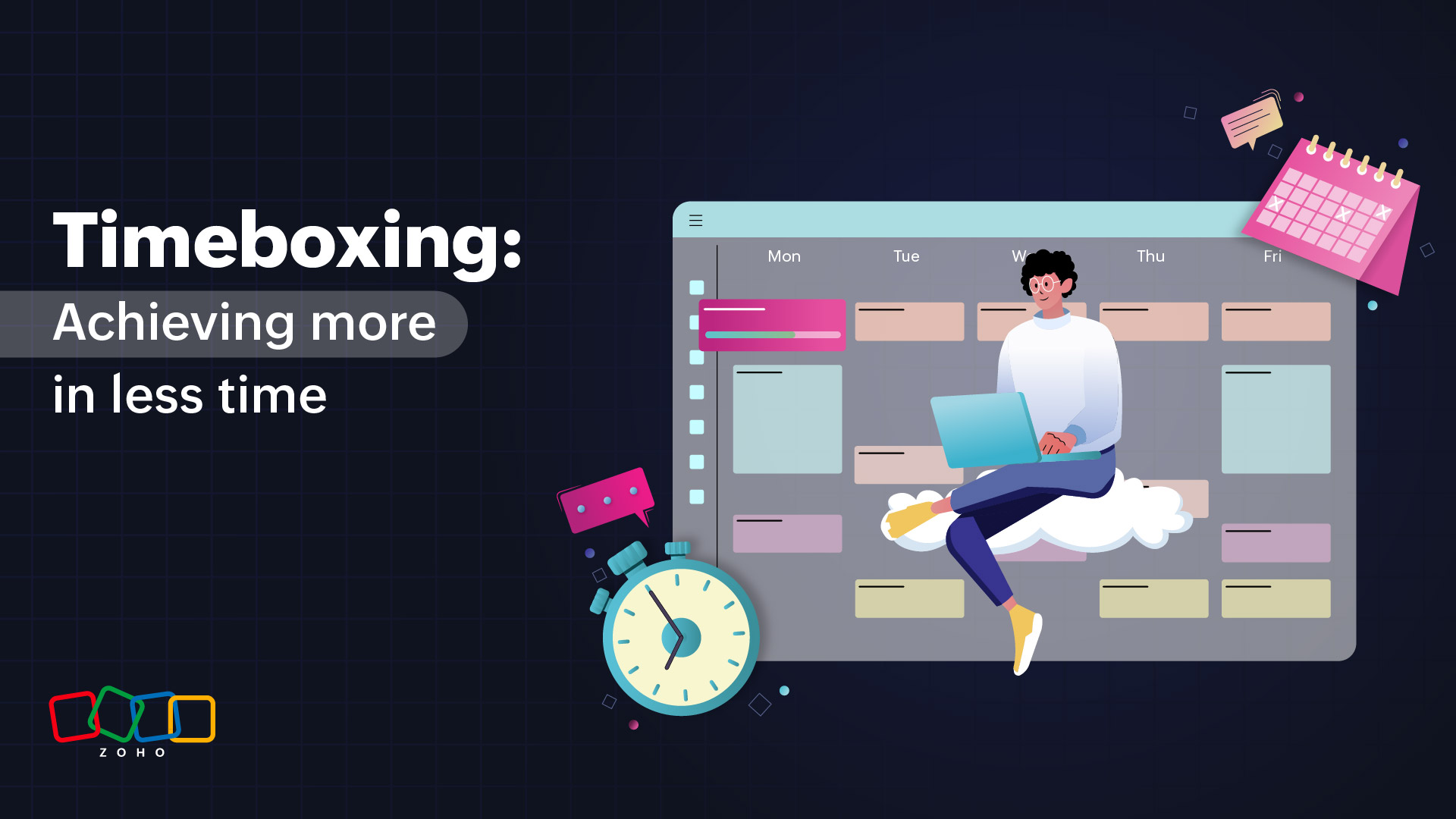


Comments(4)
I totally agree with your article. I also added that using a calendar is nice, but not enough : it has to shared to colleagues , customers & family (we often forget them! ). A calendar main purpose is to guarantee your availability (or not...) , so if it's only on your desk, well that's a start but time blocking is more than that
Thanks for reading the article, David. You make a good point about sharing our calendar!
Informative, and I can't wait to implement it into my daily work routine : ) Kudos to the author!
Hi, Desh, I'm glad you found it informative! Do let us know your results after implementation.